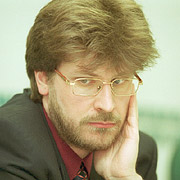© «Russia
in Global Affairs». №
2, April — June 2007
 The last few months have been
The last few months have been
marked by heated debates as to whether a multipolar world is now a
reality and whether a new Cold War is imminent.
Actually, one
option rules out the other. Within a system where there are many
centers of force, a Soviet-American-type confrontation is
impossible. Naturally, Moscow and the Western capitals are free to
exchange criticisms and even threats between each other. But in
doing so, they must bear in mind that it will be third parties that
will score in this game. Such parties include international
terrorist organizations, as well as ambitious nations that seek to
achieve “historical justice” taking thereby their “worthy” place on
the international stage.
Russian Foreign
Minister Sergei Lavrov emphasizes the complex nature of the current
world order. In an article that he contributed to this issue, Mr.
Lavrov expresses his conviction that attempts to establish
unilateral dominion in the world have failed. As a result,
painstaking efforts will have to be made to restore the global
balance on the basis of equality.
The G8 has a
special role to play in these efforts. Many analysts view it as a
prototype of a new global governance body. Canadian researcher John
Kirton and his Russian colleague Marina Larionova write about the
prospects for this group and Russia’s role in it.
Is NATO able to
become an instrument for ensuring global security? An official of
the Collective Security Treaty Organization, Mikhail Kokeyev,
challenges arguments that favor NATO’s ability to keep peace, put
forward by NATO Headquarters officers Rad van den Akker and Michael
R?hle.
General Vladimir
Dvorkin analyzes U.S. plans to deploy a missile defense system in
Eastern Europe. He believes these plans do not pose a military
threat to Russia; nevertheless, he views Washington’s intentions as
very harmful since they have the ability to destroy the very
foundation of strategic partnership. Another Russian analyst,
General Pavel Zolotarev, warns about the dangers of searching for
enemies as a pretext for beefing up defense budgets.
Professor Sergei
Luzyanin focuses on Moscow’s policy toward fast-developing
countries of Asia, which play an increasing role in Russia’s
international relations. Europe is watching with increasing
suspicion the role that the “Eastern vector” is playing in Russian
policy, while trying to determine if this new course means a
renunciation of the “European choice,” as declared in the past by
Moscow. Professor Vladimir Pankov weighs the pros and cons of free
trade between Russia and the European Union, while economist Vlad
Ivanenko compares Russian-EU integration with other possibilities
opening up before Russia.
Russian scholar
Timofei Bordachev reflects on the prospects of the European Union,
which recently marked its 50th anniversary, and outlines the
contours of its future relationship with Russia. This issue also
carries an interview with Jacques Delors, former president of the
European Commission and one of the most outstanding fathers of the
United Europe, about the EU’s history and future. Meanwhile,
Belarusian journalist Yuri Drakokhrust draws an unexpected
conclusion in his article. He argues that, should Belarus join the
European Union, it will be a reliable stronghold of Germany, as
opposed to the United States, now ardently supported by other
post-Communist countries.
Georgia’s
ex-Foreign Minister Salome Zourabichvili raises one of the most
acute problems of our times – the final consequences of the Kosovo
settlement. She proposes that nations work together to create
universal criteria for settling frozen conflicts in order to make
the Kosovo case a positive, rather than negative,
precedent.
Russian political
analyst Sergei Markedonov proposes that Moscow and Tbilisi leave
aside their mutual territorial problems for the present time and
focus on issues that could improve their bilateral
relations.
Finally, Russian
scholar Alexei Arbatov comments on the Russian president’s annual
press conference. Analyzing the head of state’s replies, he draws
conclusions about the issues that confront the Russian state
today.
In our next
issue, we will continue discussing Kosovo-related problems, as well
as offer analysis on Russia’s federal system, the Islamic factor in
Russia’s foreign policy, the threat of nuclear terrorism and the
global financial architecture. Finally, we will focus on Ukraine,
which is experiencing turbulent times once again.
of Global Politics










